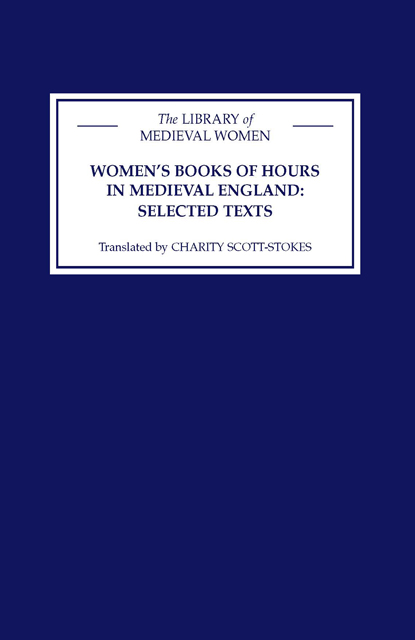Book contents
Preface
Published online by Cambridge University Press: 18 March 2023
Summary
The book of hours is said to have been the most popular book owned by the laity in the later Middle Ages. The earliest surviving exemplar made in England was designed and illustrated by William de Brailes in Oxford in the mid-thirteenth century, for an unknown young lady whom he portrayed in the book several times. Women were often patrons or owners of such books, which were usually illustrated. It is clear from manuscript catalogues, and from authoritative studies such as those by Janet Backhouse, John Harthan and Roger Wieck, that the majority of the surviving medieval books of hours were made and used in continental Europe. Yet some were made in England, or for use in England, and of these at least fifty can be positively identified as having been made for a woman patron, or having been in female ownership at an early date.
This volume brings together a selection of texts in translation from women's books of hours. The texts are of great importance to a Library of Medieval Women, since they are fundamental to an understanding of medieval piety, and women book owners recited them regularly. Although some do actually still occur in bibles or prayer-books, others have to be sought in specialist publications, often embedded in other material, and a few have not until now been available at all in modern editions or translations.
Most of the manuscripts considered here are now located in British libraries. One is in Germany. Manuscripts from Boston, New York, and Urbana-Champaign in Illinois provide only a representative sampling of books of hours in American collections. A full investigation of American libraries would undoubtedly yield further manuscripts of great interest and relevance to this field of study.
The book is intended for the general reader, as well as for students of medieval literature, social and religious history, cultural studies and women's studies, at undergraduate or postgraduate level. The glossary and annotated bibliography will facilitate access to these materials for readers who are not familiar with Christian traditions or terminology.
- Type
- Chapter
- Information
- Women's Books of Hours in Medieval England , pp. xi - xiiPublisher: Boydell & BrewerPrint publication year: 2006

